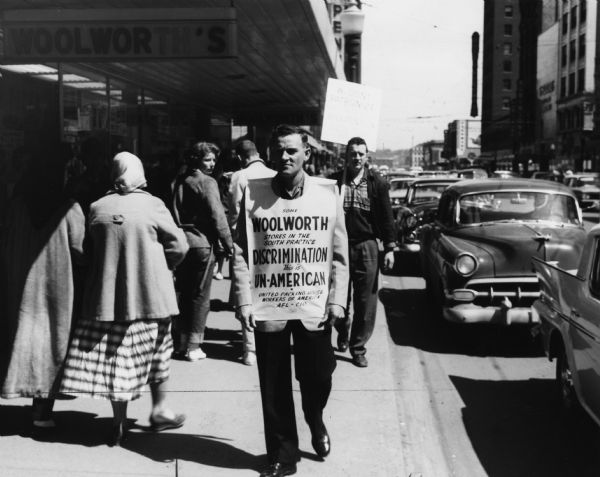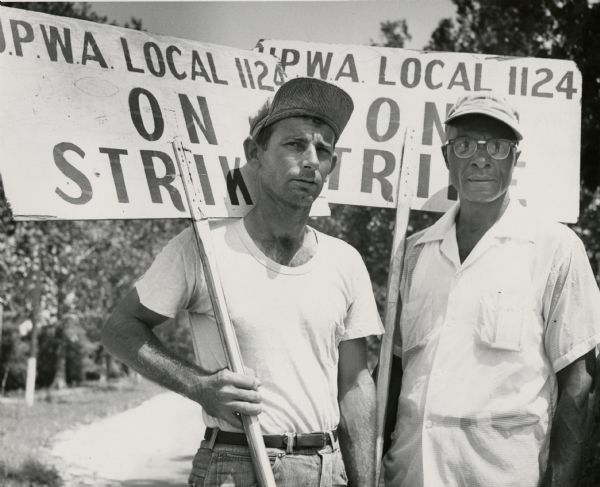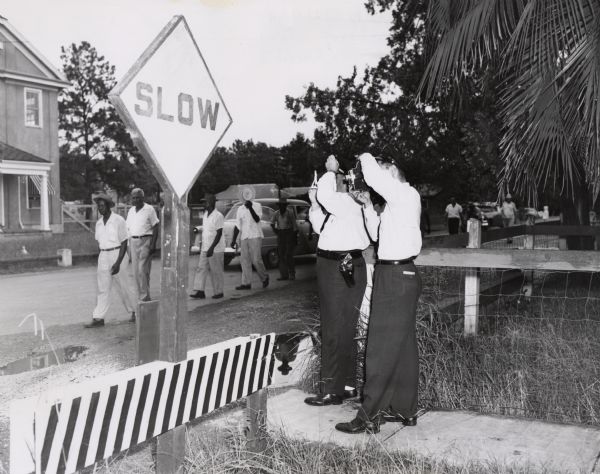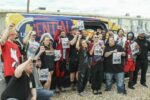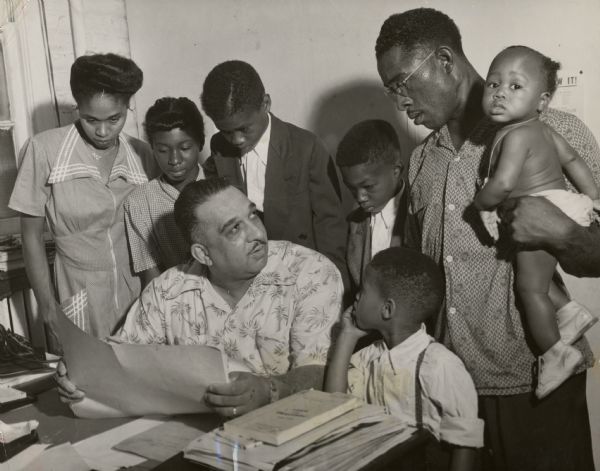
This Black History month, we celebrate the life and legacy of United Packinghouse Workers of America (UPWA) Vice-President Russell R. Lasley (1914-1989). Lasley was an officer in UPWA Local 46 in Waterloo, Iowa. He got his start working at The Rath Packing Co. and rose to become one of the central figures in the American civil rights movement. Lasley was a vice president of the international union for more than 20 years, remaining after the UPWA merged with the Amalgamated Meat Cutters and Butcher Workmen where he became director of the merged union’s civil rights department.
The United Packinghouse Workers of America was one of the most progressive champions for civil rights in the labor movement during the 1950s and 1960s. Formed in 1943, the union began pursuing anti-discrimination activities in 1949 and formed an anti-discrimination department in 1950. The UPWA required every union local to have an anti-discrimination department, and the national union headquarters made certain that the local departments had their own programs in the meatpacking plants and communities.
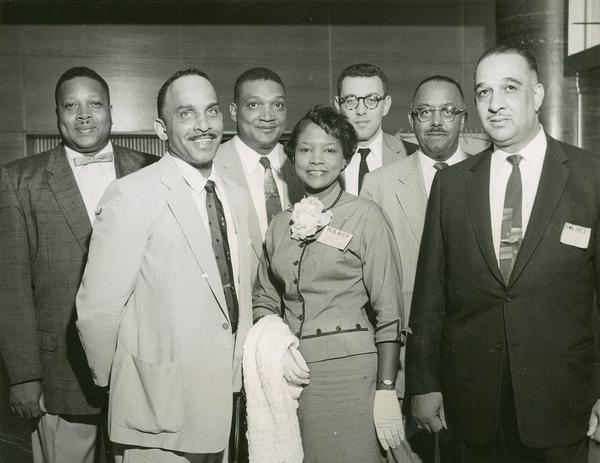
Together with the union, Lasley fought against housing discrimination in Chicago, according to labor historian Michael Honey of the University of Washington-Tacoma. “He was trying to open up housing for black families in white neighborhoods,” Honey said. “When one home was surrounded and fire bombed, the union brought people out to try to defend the black homeowner. The Packinghouse Workers union was extraordinary. It probably was one of the few unions where whites would really come out and support black civil rights.”
In addition to helping organize a march for voting rights on the nation’s capital in 1957 and forming defense committees to provide protection for Dr. Martin Luther King, Jr. when he came under attack, the UPWA also played a key role in the formation of the Southern Christian Leadership Conference.
The Southern Christian Leadership Conference (SCLC) was a group of southern churches and clergy who together coordinated protests and demonstrations in the wake of the successful Montgomery Bus Boycott.
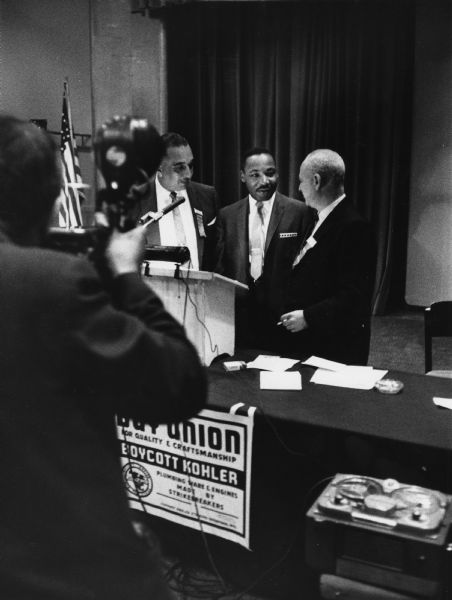
Lasley attended the founding meeting of the Southern Christian Leadership Conference (SCLC) in January 1957, calling it ‘‘an extreme honor and privilege to represent UPWA in a conference of leaders who have dedicated their lives to the cause of freedom and the establishment of a society free of racial injustice and second class citizenship.”
In addition to continually organizing conferences and legislative actions in support of equal rights for women and minorities, the UPWA donated 80 percent of the cost of SCLC’s first year budget and held regular drives to raise money for sit ins and freedom rides. “I guess the Southern Christian Leadership Conference would not have existed without the Packinghouse Workers union,” said King scholar Clayborne Carson, professor of history and director of the Martin Luther King Jr. Research and Education Institute at Stanford University in California.
Ever a visionary, in his address to the members of the UPWA at their 1962 convention in Minneapolis, Minnesota, King warned that the advances of technology were outpacing government’s ability to find creative solutions to the threats to workers they posed. His warnings were prophetic- facing enormous job losses in the packinghouses after automation shook the foundations of the meat-packing industry, the UPWA’s remaining membership merged with the Amalgamated Meat Cutters and Butcher Workmen in 1968. The Amalgamated Meat Cutters and Butcher Workmen would later go on to merge with the Retail Clerks International Union in 1979 and form what today is the United Food and Commercial Workers International Union.
Excerpts from Dr. Martin Luther King’s Address to the United Packinghouse Workers of America
May 21, 1962The United Packinghouse Workers of America has set an example for every democratic organization in the nation. Indeed, if labor as a whole, if the administration in Washington, matched your concern and your deeds, the civil rights problem would not be a burning national shame, but a problem long solved and in its solution a luminous accomplishment in the best tradition of American principles.
In the early days of organization of our Southern Christian Leadership Conference, you employed the shop collection to raise significant funds for us. As we continued our struggles for human dignity, you remained a constant supporter in some of our darkest hours when the most savage elements among our adversaries took control.
Your dependable help was like a mighty fortress protecting us. Your aid, however, went beyond money. When various city and state officials of the state of Alabama, in abuse of legitimate judicial process, instituted a series of libel suits against us in an attempt to wreck our leadership, you provided brilliant legal aid through your union council to strengthen our defense.
The debt we owe you is great, and we cannot repay you today, but our memory is long and our gratitude is lasting, and when the day comes when we have won victories enough to have some surplus strength, it will be yours to command.
Another proud distinction your union possesses is its record of dealing with discrimination internally. In the last analysis, this is an acid test. It is not easy and it is rarely accomplished completely because the whole of our society is pulsing with racism, but the steps you have taken are longer and more decisive than others can boast. Indeed, though I am no historian of labor, I feel safe in saying that even within the CIO tradition where discrimination was fought with conscious purpose your record is the best. In America today this is the highest expression of patriotism and moral responsibility.
It is never easy to pioneer, but you did it while organizing a powerful industry whose abuses of public welfare were so extreme that they became a legend recorded in our literature by Upton Sinclair in his book The Jungle. That jungle was finally cleared and civilized by legislation and the adoption of socially responsible practices.
However, today a new jungle is creeping back, swallowing up and nullifying the achievements of the past, and this new jungle is not a wilderness of nature. It has the shining glittering face of science. It consists of the negative effects of automation and the runaway shop.
Both of these are destroying your jobs, changing your lives, while plays to counteract their destructive effects are either inadequate or nonexistent….
As machines replace men, we must again question whether the depth of our social thinking matches the growth of technological creativity. We cannot create machines which revolutionize industry unless we simultaneously create ideas commensurate with social and economic reorganization, which harness the power of such machines for the benefit of man….The new age will not be an era of hope but of fear and emptiness unless we master this problem….
Like you, we are deeply concerned with minimum wages, with social security, with health measures. We, along with you, want housing fit for families to live in happily and comfortably. Like you, we want job certainty in our working days and retirement security when we grow old. A society as dynamic as ours can provide these things if it is as flexible and inventive as the science which is such a vital part of it….
Years ago, it became a proud boast of the packing industry that by the application of science no part of the animal was wasted. “Everything but the squeal of the pig” was converted into a socially useful product. It is fair to say that if this could be done by one industry with pigs, all of society should seem capable of progress without wasting any people! This is the achievable test of the new age.
We will have no fear of the future if we master together the task of the present. So much that we have already done together proves that in going further and strengthening our ties we will inevitably enrich the lives of all of us, bringing democratic dynamism into the political bloodstream of the nation. Lest we forget, the men who established our country were in the main ordinary people – but they had an extraordinary dream that all problems could be solved by united action; by participation of all upon an equal basis.
They called their dream democracy. Nearly two hundred years later, if we now faithfully develop and practice democracy, transforming it into living reality for all of our citizens, it will fashion a new era of abundance in material and moral riches.
